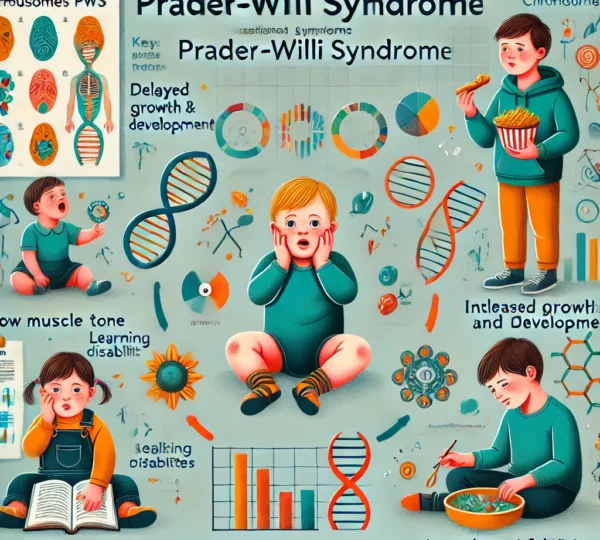Understanding Prader-Willi Syndrome: A Rare Genetic Condition Affecting Growth and Development
Prader-Willi syndrome (PWS) is a rare genetic disorder that affects growth and development. It happens due to a missing or faulty gene on chromosome 15. People with PWS have unique physical and behavioral features. Common symptoms include weak muscles, short height, high appetite, learning difficulties, and behavioral issues.
Recognizing Prader-Willi Syndrome Symptoms
Symptoms of PWS can vary from one person to another, but the most common ones include:
- Low Muscle Tone in Infants: Babies with PWS often have poor muscle strength, making it hard for them to move.
- Delayed Growth and Development: Children with PWS may grow slower and reach milestones later than others.
- Increased Appetite (Hyperphagia): As children grow, they may develop an unusually high appetite, leading to weight gain.
- Learning Disabilities: Many individuals with PWS face challenges in learning and may need extra help in school.
- Behavioral Challenges: This can include temper tantrums, aggression, and repetitive behaviors.
What Causes Prader-Willi Syndrome?
Prader-Willi syndrome is caused by changes in genes on chromosome 15. This gene plays an essential role in controlling hunger and metabolism. When this gene is missing or does not work, it disrupts hunger signals, often leading to overeating and weight issues.
How is Prader-Willi Syndrome Diagnosed?
Doctors usually diagnose PWS by observing symptoms and performing a physical exam. Genetic testing is used to confirm the diagnosis. Early diagnosis is important because it allows for timely support and care.
Treatment and Management for Prader-Willi Syndrome
There is no cure for PWS, but treatments can help manage symptoms. Common treatment options include:
- Medical Support for Appetite Control: Medicines and dietary changes help control hunger.
- Behavioral Therapy: This therapy teaches coping skills for managing temper and behavioral issues.
- Special Education Services: Tailored learning support helps with school challenges.
- Support Groups for Families: Joining a support group can provide guidance and emotional support.
Conclusion: Living with Prader-Willi Syndrome
Prader-Willi syndrome presents significant challenges, but early diagnosis and effective treatment make a difference. If you suspect your child has PWS, consult a doctor for testing and explore treatment options. Through a mix of medical care, therapy, and support, individuals with PWS can lead a better quality of life.
For More Information Click here



